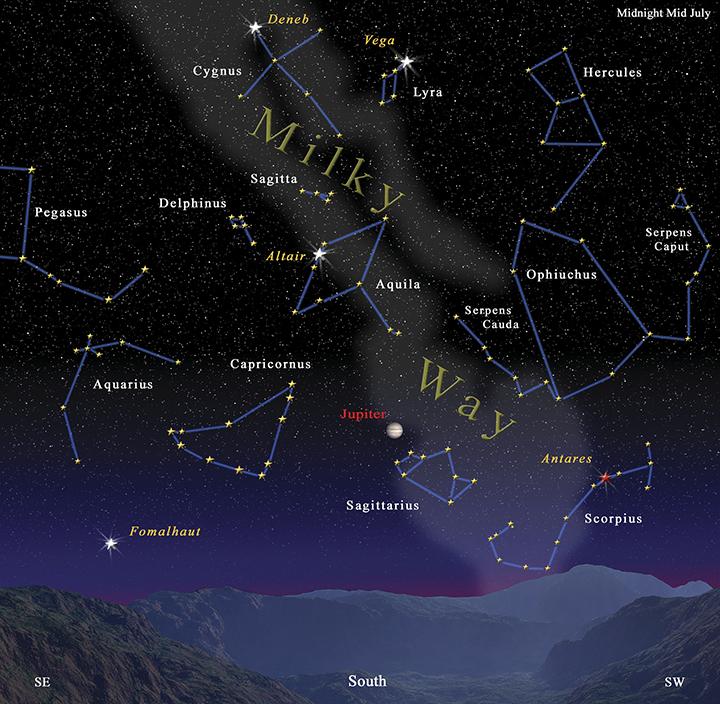Constellation For Hire
No figure of the Old West is more iconic than the gunfighter—the lone wolf with the tortured soul, traversing a hostile landscape, selling his skills to the highest bidder for “a few dollars more.” The figures of the sky predated firearms, so nobody up there is packing. But the heavens hold the Greek equivalent of the western gunslinger in the form of Heracles (Hercules, as the Romans called him), who rides high on summer evenings, with exploits enough to make even Wyatt Earp jealous.
Like his western counterparts, Herc plays it cagey, and his medium-bright star pattern can be challenging to make out. Look to the west of Vega—the brightest star of the Summer Triangle trio of Vega, Altair, and Deneb—for a butterfly shape of six stars that also looks like a crooked letter “H,” and you’ll have found his torso. Note that he’s upside down, though, with the southernmost pair of stars forming his shoulders. His arms flail out from these two, and his legs from the uppermost pair—and he’s almost bumping heads with Ophiuchus below.
Hercules himself led a topsy-turvy life. He was born of the great god Zeus and a mortal woman named Alcmene whom Zeus visited one night disguised as her husband. The god had big plans for Hercules right from the start when he slipped him onto the breast of his goddess wife Hera while she slept, to drink the milk of immortality. But Hera awoke and pushed the baby away, causing her milk to spill across the sky, becoming what the Romans called the Via Lactea—the Milky Way.
From that auspicious beginning, Hercules grew into a rough-and-tumble character who regularly suffered the torments of the vengeful Hera. Sometimes he won—as when he strangled the two snakes the goddess sent to his crib to do him in. Sometimes he lost, as when in later life, Hera seized him with a madness that caused him to kill his first wife and their children. As penance, Hercules hired out to King Eurystheus of Mycenae, who commanded him to perform his famous twelve labors.
And so Hercules fought his way to fame and glory, clad in lion skin and armed with club and poisoned arrows, using his strength and prowess to dispatch many a foe. The sky is littered with his casualties, including the Nemean lion (Leo), the Lernean serpent (Hydra), and Cancer the Crab, all of whom he killed during the course of his labors. Those tasks also included cleaning out the stables of King Augeus by diverting two rivers to flush them out; tricking Atlas, who held up Heaven, into fetching the Golden Apples of the Hesperides while Hercules spelled him; and wrestling Cerberus, the three-headed Hound of Hades, into submission and delivering him to the king.
But as any hombre-for-hire knows, “live by the gun . . . “
Hercules remarried, having wooed the beautiful Deianeira. But one day the centaur Nessus got fresh with her, and Hercules promptly shot him with one of his poisoned arrows. The dying centaur whispered to Deianeira to take some of his blood, which would act as love potion should Hercules ever stray. Some time later, when Deianeira was feeling insecure about a lovely maid her husband had won as a war prize, she doused a tunic with the blood. When Hercules put it on, they both found out that Nessus’ blood was a poison of its own and burned his flesh unmercifully. The gods had pity on the suffering Hercules, and he was lifted up into the heavens and relief, where he shines today, his legend living on.
This summer, the planet Jupiter (Zeus) drifts below in Sagittarius to see how his boy is doing. He’s doing just fine, wheeling with the legendary stars of summer over the murmuring nightscape of the West.












